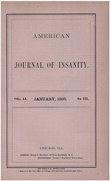No evidence for allelic association between schizophrenia and a polymorphism determining high or low catechol O-methyltransferase activity
Abstract
OBJECTIVE: Catechol O-methyltransferase (COMT) inactivates catecholamines by methylating their m-hydroxy group. Some previous studies using biochemical methods have found higher levels of COMT activity in schizophrenic patients. Recently, the genetic polymorphism that underlies variation in COMT activity, which results in the creation of a NlaIII restriction site in the low-activity allele, has been elucidated. METHOD: This study investigated this polymorphism in 78 unrelated schizophrenic patients and 78 comparison subjects matched for age and ethnicity. High-molecular-weight DNA was isolated from lymphocytes with routine procedures, and each individual was typed for high and low COMT activity. RESULTS: The frequency of the NlaIII polymorphism was 0.51 in the schizophrenic patients and 0.53 in the comparison subjects, and no significant allelic or genotypic associations were observed. CONCLUSIONS: There was no evidence for variation in COMT activity between a group of schizophrenic patients and matched comparison subjects.
Access content
To read the fulltext, please use one of the options below to sign in or purchase access.- Personal login
- Institutional Login
- Sign in via OpenAthens
- Register for access
-
Please login/register if you wish to pair your device and check access availability.
Not a subscriber?
PsychiatryOnline subscription options offer access to the DSM-5 library, books, journals, CME, and patient resources. This all-in-one virtual library provides psychiatrists and mental health professionals with key resources for diagnosis, treatment, research, and professional development.
Need more help? PsychiatryOnline Customer Service may be reached by emailing [email protected] or by calling 800-368-5777 (in the U.S.) or 703-907-7322 (outside the U.S.).



